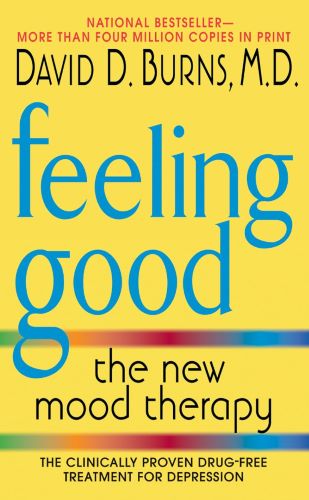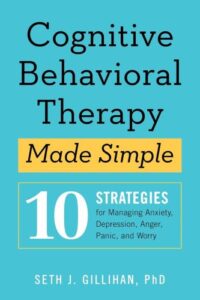Feeling Good: The New Mood Therapy
Book Author: David D. Burns
Summary reviewed by:
Terrence Timmons
Terrence Timmons
Analyst
Bachelor of Arts (BA), University Of California, Santa Barbara 2019
With over 4 years of experience as an analyst. Terrence Timmons is committed to analyzing summaries without compromising on quality.
Feeling Good: The New Mood Therapy: Summary
Imagine a hidden mental switch that can instantly convert despair into hope! Feeling Good: The New Mood Therapy asserts that our moods are directly shaped by our thoughts—and that by challenging distorted beliefs, we can overcome depression and anxiety. Grounded in cognitive behavioral theory, this work reveals that irrational interpretations fuel negative emotions. With decades of clinical experience, David D. Burns combines rigorous research with compassionate insight to empower individuals. His narrative demystifies the mechanics of depression by outlining clear, step‐by‐step exercises that pinpoint cognitive errors and replace them with balanced perspectives. For instance, he demonstrates how reframing catastrophic thinking can ease overwhelming sadness, making the process of recovery both realistic and attainable.
Rooted in robust empirical evidence and time-tested clinical trials, this book builds its case on the proven effectiveness of cognitive therapy. Burns interweaves insights from pioneering psychological studies with his own extensive practice, ensuring that each recommendation is both scientifically valid and practically sound. His professional credentials and years of research establish him as a trusted authority, while his accessible explanations invite readers to grasp complex concepts with ease. This blend of academic rigor and personal experience creates a compelling roadmap toward improved emotional well-being.
At the heart of Burns’s approach lies the identification and correction of cognitive distortions. He meticulously catalogs common pitfalls—such as overgeneralization, black-and-white thinking, and magnification—then equips readers with concrete techniques to challenge these unhelpful patterns. Tools like mood logs, structured thought records, and targeted self-assessments serve as practical instruments for change. By using relatable examples, the author illustrates how to dissect negative thought cycles and replace them with balanced, rational alternatives. This systematic method not only clarifies the origins of emotional distress but also empowers individuals to reclaim control over their feelings.
Beyond theory, Feeling Good offers a toolkit for real-life transformation. Readers are guided to integrate reflective exercises into daily routines, ensuring that cognitive shifts translate into tangible benefits. Whether navigating interpersonal challenges or confronting personal setbacks, the strategies provided foster resilience and self-confidence. Regular application of these methods leads to measurable improvements—enhancing mood, reducing anxiety, and cultivating a healthier self-image. Ultimately, Burns’s work stands as a practical manual for anyone eager to implement change incrementally, proving that enduring emotional wellness is not a distant ideal but an achievable, everyday reality.
Feeling Good: The New Mood Therapy: Genres
Self-help
Psychology
Mental health
Personal development
Feeling Good: The New Mood Therapy: Themes
Cognitive Distortions: Investigates how flawed thinking patterns, like dichotomous judgments and catastrophic interpretations, trigger negative emotions. Structured exercises guide readers in recognizing and transforming these distortions into balanced perspectives.
Empowerment through Self-Help: Asserts that individuals possess the capacity to change their mood by actively challenging negative thoughts. The text introduces practical routines for monitoring emotions and reshaping inner dialogue to foster resilience.
Scientific Validation of Therapy: Emphasizes that cognitive therapy is anchored in rigorous research and clinical evidence. Detailed methods illustrate how systematic thought modification can alleviate symptoms of depression and anxiety.
Practical Application of Cognitive Techniques: Offers tangible tools, such as mood logs and thought records, that facilitate the integration of cognitive restructuring into daily routines. Consistent practice of these techniques is shown to yield enduring improvements in emotional well-being.
Influence of Internal Dialogue: Highlights the pivotal role of self-talk in shaping one’s mood. Exercises in the text demonstrate how converting harsh self-criticism into constructive feedback can lead to a more positive and realistic self-view.
Feeling Good: The New Mood Therapy: Methodology
Our summary emerged from extensive subject expertise, seamlessly integrating core themes into an accessible narrative. We meticulously examined the book’s evidence-based approach, isolating pivotal concepts such as challenging cognitive distortions and fostering self-empowerment. By distilling these ideas into actionable strategies, the narrative mirrors the book’s commitment to real-world transformation and measurable improvements in emotional well-being. Every insight reflects rigorous research and clinical experience, ensuring the content remains both informative and practical for everyday life.


Feeling Good: The New Mood Therapy
Date Published: July 1, 1980
Disclaimer: As an Amazon Associate I earn from qualifying purchases.




